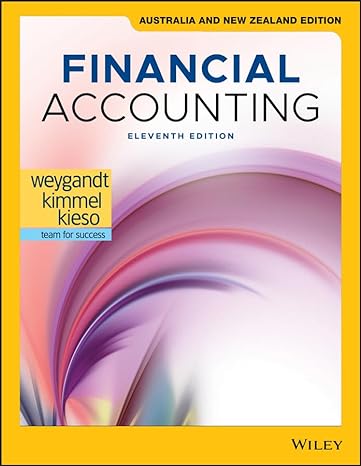Question
John Richard operating a business on his own. His Taxable income is $100,000 per annum but is expected to grow quickly when planned expansion is
John Richard operating a business on his own. His Taxable income is $100,000 per annum but is expected to grow quickly when planned expansion is undertaken. There are prospects of exporting goods to North America.
Present operations involve the manufacture and sale of sporting goods. About 15 people are employed and most have been with John for over 10 years. Employees are paid over-award wages and are given a lavish Christmas party for themselves and their families each year. At present, John pays for the party out of his own funds.
John bought the premises 10 years ago and while the buildings are in good shape, the grounds need attention. A new driveway and landscaping are essential, and the installation of a practice and testing area would greatly boost sales. New plant and equipment are needed as much of the existing plant and equipment have been held for over 10 years. It is still in working order and, although written off for tax purposes, has a market value of about $15,000.
John has two inventions that he patented a year ago and these could be quite valuable. A lot of stock that is held could be scrapped as it is holdings of outdated equipment. John and his sales manager need new cars. Debtors amount to $7,500, most of which probably are not collectable.
John has life insurance cover of $25,000 but does not have any superannuation. He is 45 years old and plans to retire at 60. He has a wife who has no separate income. They have four children: a daughter aged 22 attending Harvard Law School, who has no Australian source income and is likely to remain in the USA after graduation next year, a son aged 17 who is about to start an apprenticeship with the business, and twin daughters who are about to start school (which will allow Mrs John to work in the business on a part-time basis).
John comes to you for advice. In particular, John wants to know whether he should incorporate it. Prepare a report for John advising him on the implications (tax and otherwise) of incorporating his business. John would like to see in the report at least the following:
(a)a table summarising the advantages and disadvantages (tax and non-tax) of incorporating;
(b)a brief discussion of particular issues, presented under separateheadings. Some suggested issues to cover are (Driveway andlandscaping, Trading stock, Costs and deductibility ofincorporation, Rate of tax, Method of payment of tax, Long serviceleave, Fringe benefits tax, Capital gains tax, superannuation, Issueof additional shares, Imputation)
Step by Step Solution
There are 3 Steps involved in it
Step: 1

Get Instant Access to Expert-Tailored Solutions
See step-by-step solutions with expert insights and AI powered tools for academic success
Step: 2

Step: 3

Ace Your Homework with AI
Get the answers you need in no time with our AI-driven, step-by-step assistance
Get Started


